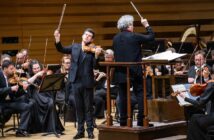
This page is also available in / Cette page est également disponible en:
![]() Francais (French)
Francais (French)
“If it were not for my mother, this orchestra would not exist,” Boris Brott, artistic director and chief conductor of the Orchestre classique de Montréal, says forthrightly about Lotte Brott, 1922-1998, who served as the manager of what was long known as the McGill Chamber Orchestra.
“If it were not for my mother, this orchestra would not exist,” Boris Brott, artistic director and chief conductor of the Orchestre classique de Montréal, says forthrightly about Lotte Brott, 1922-1998, who served as the manager of what was long known as the McGill Chamber Orchestra.
Since existence is a condition much preferable to nonexistence, the coming centennial of Lotte’s birth seemed worthy of recognition by the ensemble she fostered so assiduously and also served – despite health obstacles that included multiple sclerosis – as a cellist. The 2021-22 OCM season, titled Women of Distinction, is accordingly dedicated to her memory and to high-achieving female artists in general.
“Recognition of women is certainly current and important,” the conductor adds. One suspects that Brott’s father and predecessor on the podium, Alexander Brott, 1915-2005, would not object to the double dedication. Inevitably, the tribute takes different forms in different concerts. The composers represented in the season opener on Nov. 9 – Samuel Barber and Beethoven – are male. The piano soloist, Sara Davis Buechner, started her career as David Buechner. The concert is a fundraiser for GRIS-Montréal, an organization that seeks to demystify questions of orientation and identity.
All the works will be heard in arrangements. It is not often recognized that Barber’s celebrated Adagio started life as the slow movement of his String Quartet. Beethoven’s Piano Concerto No. 3 is heard in a version for string orchestra by Nurhan Arman, the artistic director of Sinfonia Toronto. The same composer’s String Quartet Op. 95 is heard in Mahler’s arrangement.
Next up on Nov. 23 is a program highlighted by the premiere of Gwekaanmat, a 20-minute concerto for pipigwan (Anishinaabe wooden flute) and string orchestra by Barbara Croall, an acclaimed Odawa First Nation composer, who will function as soloist. Also heard is an arrangement by François Vallières of Ravel’s rapturous song cycle Shéhérazade with no less a mezzo-soprano than Julie Boulianne as soloist. This Quebec artist also joins forces with pianist Jean-Philippe Sylvestre in Ravel’s Cinq melodies populaires grecques.
On Dec. 7 the orchestra offers its annual performance of Handel’s Messiah with Jacqueline Woodley, Marie-Andrée Mathieu, Antoine Bélanger and Neil Craighead as soloists and Les Rugissants (Xavier Brossard-Ménard, director) doing the choral honours. This takes place in St. Joseph’s Oratory rather than Salle Pierre-Mercure, the site of the other announced subscription concerts. Brott hopes to present a hearty two-and-a-half-hour rendition rather than the COVID-era abridgement heard last December.
For the second season in a row the OCM will program music by Slavic composers, this time under the rubric of Echoes of the Steppes. Toronto-based Larysa Kuzmenko gives us Kurelek’s Gallery, a kind of Pictures at an Exhibition with canvases by her fellow Ukrainian Canadian, William Kurelek, 1927-1977, as the sources of inspiration. Other works on this Feb. 15 program are Melodiya by Myroslav Skoryk, Dvořák’s Serenade and Shostakovich’s Piano Concerto No. 1 with the Ukrainian-born Montrealer Serhiy Salov as soloist and NACO principal Karen Donnelly taking the trumpet obbligato.
Opera has become a recurring feature of the OCM season. On March 8 and 9 the orchestra presents Carmen for Four, an economical version of Bizet’s classic as staged by Centaur artistic director Eda Holmes. Taking the title role is CBC broadcaster and mezzo-soprano Julie Nesrallah. Ernesto Ramirez, Suzanne Taffot and Hugo Laporte are Don José, Micaëla and Escamillo. While this project might bring to mind Peter Brook’s La Tragedie de Carmen of 1981, the OCM reduction will incorporate more of the colourful and non-tragic elements of the opera.
On April 28 Karina Gauvin is the star of a Handel program co-produced with Ensemble Caprice and co-conducted by Brott and Matthias Maute, the artistic director of the resourceful period ensemble. “She has a voice that goes on and on and on,” Brott says of this Montreal soprano. “I think she’s phenomenal.”
The concert of May 17 involves another co-conductor, Geneviève Leclair, and an array of women soloists, including harpist Valérie Milot, pianist Élisabeth Pion, guitarist Annie Labrie and flutist Nadia Labrie in Mozart’s Concerto for Flute and Harp K. 299, Haydn’s Piano Concerto in D major and Patrick Roux’s Concerto Tradicionuevo. The Labries – twins – are soloists in this last piece.
Perhaps the greatest source of interest on this penultimate program of the season comes from Carmen Braden, a Yellowknife composer who bills herself as an “acoustic ambassador of the Canadian subarctic” and will supply a new piece titled She rides her bike with a cello on her back and a baby in the basket. The subject is Lotte Brott, who, in her early days as a section cello player with the OSM, used to cycle from the family home in NDG to Plateau Hall in the east end – sometimes, according to legend, with Boris or his brother Denis along for the ride. “I think my mother was a very special person,” Brott says.
A further major event is planned, in the Maison symphonique, but this is TBA. Brott expects there to be an online component to the season, as there was in 2020-21. Details are under discussion.
https://orchestre.ca
This page is also available in / Cette page est également disponible en:
![]() Francais (French)
Francais (French)














